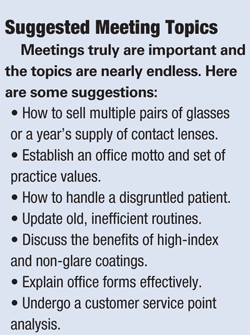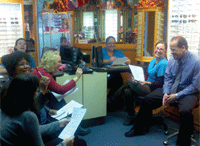Practice management seminars tell you over and over again to act like the CEO of your practice. While you might be Chief Executive Officer, you are really so much more. You find out that you are the “Chief Everything Officer.”
As the “CEO,” one of the key ingredients in running a successful practice is to hold regular office meetings. There is just one problem: Everyone—including the CEO—dreads these meetings. Is there a reasonable and productive solution to boring office meetings, employee malaise and declining morale?
Yes, there is.
Stop being the Chief Everything Officer for these meetings. Like other aspects of running a practice, you can delegate your weekly office meetings to your staff. It not only makes meetings more productive, but it even puts the “fun” back in these “functions.”
Here’s how I did it.
Where I Went Wrong

I have attended office meetings, both as an employee and as an employer. While working as an optometric technician back in my undergraduate days, I endured many boring after-hours meetings. The doctor and the office manager never had anything pleasant to say. As employees, we avoided contributing to the discussion. Since the meeting topics never changed, after a few weeks I started hearing the doc’s words in my head before he started speaking. The meetings were inconvenient and ineffective, and they hurt office morale.
Five years ago, I bought an existing practice and inherited two staff members and a retiring doctor. My new staff had a combined 80 years of experience, while I was just 24 years old and had no experience running a business. We held weekly office meetings because that is what we were supposed to do. Everyone involved, from staff to the doctors, dreaded these meetings, just like those I had as a technician. Since we were making many changes to the practice, most of our discussions were about protocol and rules.
I quickly became frustrated when I didn’t see immediate results from the staff. They continued to do things the old way. They either were not listening or they were avoiding the changes that were designed to make their day easier. Believing the problem was the employees, I fired them and hired new staff. While starting fresh may have been a smart move, I cannot help but think that the problem really stemmed from our ineffective meetings.
The new staff adapted to our practice easily, but our meetings continued to be frustrating for everyone. I read as many practice management articles as I could find and attended countless seminars. I knew with certainty that we should continue holding regular meetings...so we kept pushing through them.
Hand Over the Reins
Four years and a dozen employees later, I was sitting in a practice management seminar about staff training. The lecturer explained that we learn best when we enjoy the material. I started thinking of my weekly office meetings as mini-training sessions and realized that changing the format could make our meetings more effective. I decided the best material to study is the material I want to study. The same had to be true for my staff.
I decided that our practice would no longer have traditional meetings. Instead, the staff would host the meetings. More importantly, they would choose the subject matter and material.
At first, the staff was resistant to the change. Three meetings later, they actually began to enjoy themselves because they knew each discussion would be fresh and different.
The format is simple. At each meeting, one staff member presents on his or her topic of choice, much like a book report. To get the ball rolling, I provided them with a list of ideas.
Drawing from my large collection of journal articles, I picked out pieces that would be of interest to the staff and beneficial to my business. I scanned articles on a variety of topics ranging from staff personalities, planning for retirement, product technology and sales techniques. Not only do we discuss the latest and greatest lens designs and coatings, but also I took the opportunity to get their input on office policies, customer service situations and sales techniques.
I put all of the scanned articles on our office server so everyone could access them. I posted a rotating meeting schedule for the staff that only listed a date and employee name. A day before each meeting, the scheduled leader would add his or her topic to the sign-up sheet. Since the schedule is posted in the break room, everyone can plan and prepare for the upcoming discussion. Discussion leaders would use the scanned articles as a starting point for their presentation. Our meetings are an hour long, beginning with a 10 to 15 minute presentation on the topic of the day. I use any remaining time after discussions to cover positive agenda items from a running list I keep on my desk.

Staff members take turns leading the weekly meetings.
Keep a Positive Attitude
Our meetings are now so productive that we meet twice a week. They are an open forum for conversation that includes friendly banter and laughter. We start with a goal report and open discussion of challenges and successes. Most of the staff topics centered on customer service and communication.
By each of us contributing to the topic, we learn new information from different perspectives. We’ve found that, over time, open conversation between coworkers builds trust and deepens relationships between staff members.
These meetings are also an opportunity to set a productive atmosphere for your office. I have an unspoken rule that only positive comments can be made during these meetings. Staff mistakes or other personnel issues should be handled privately unless there is a generalized issue that can be gently addressed with the group. Office meetings are neither the time nor the place to correct chronic or individual behavior. They are the place to set policies and encourage good behavior with the input of those who are on the front lines. At the end of the day, if your staff is on board with your decisions, less drama will reach your desk.
Participation in office meetings should be mandatory, but not iron-fisted. Someone should take notes to be transcribed and distributed to those who couldn’t attend. The meeting minutes should also include a list of attendees, which will later be filed in your permanent records.
Most importantly, remember that you depend on your staff. It is important to foster a healthy relationship with them. You want your staff both working for you and working with you.
When managing staff is less time-consuming, you can focus on other aspects of being the Chief Everything Officer.
Dr. Brian Spittle and his wife, Norma Spittle, O.D., are the “Chief Everything Officers” of their private practice in Midlothian, Va.

